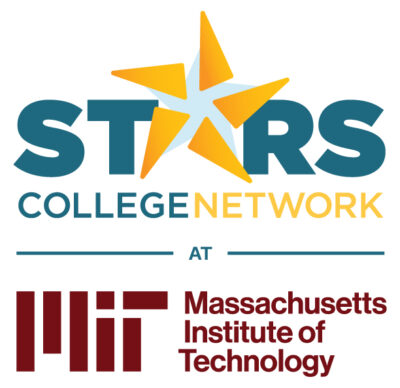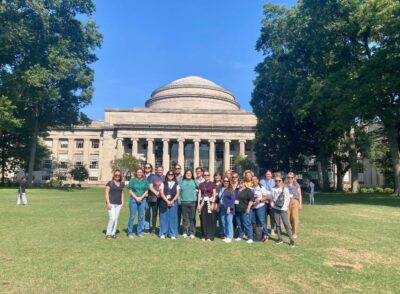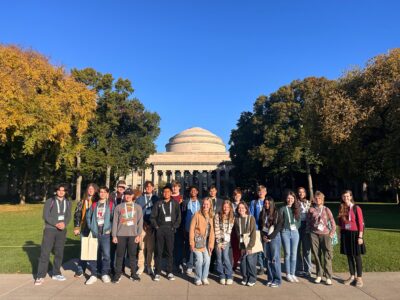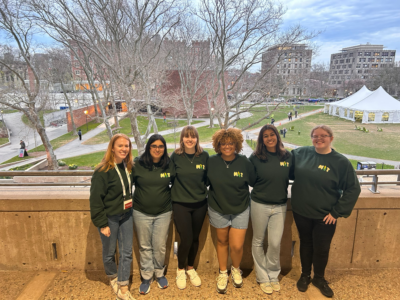
[Guest Post] STARS@MIT: A Year in Review by Nicole Cooper
By Claire S. '25

We’ve been busy at the STARS College Network at MIT! This past year marked our second year as part of the consortium, and we’ve received a lot of great questions about the partnership—questions like: “What is STARS?” “What does MIT do as part of it?” and “How can it help me?”
Well, the short answer is: we’ve been doing a lot! So we asked Claire, one of our STARS (Small-Town and Rural Student) Ambassadors, to give you a quick recap of everything we’ve been up to this past year.
Spoiler alert: it’s been a big year. Check it out!
STARS@MIT: A Year in Review
When I was applying to college, I sometimes felt like I didn’t have people to turn to for advice in my small town. That’s why I’m so excited to share what STARS@MIT and the STARS Ambassadors—current college students from small-town and rural areas—have been doing to support rural high schoolers exploring their college options. These ambassadors serve to complement MIT’s partnership with the STARS College Network, a network of 32 colleges across the U.S. with programs tailored specifically for small-town and rural students.
As a STARS Ambassador myself, I can confirm that we’ve been really busy over this last year, brainstorming ways we could give rural students the resources we wish we’d had when applying to college and deciding on the right fit for us. So as we wrap up our first full academic year of programming, here’s a year in review of what STARS Ambassadors at MIT have been up to—and what’s still ahead!
Webinars
STARS@MIT hosts several webinars, run by both admissions officers and STARS Ambassadors. So far, topics have included applying to college as a rural student and what to expect if you decide to go to college far from home or in a big city. The end of each session leaves time for participants to ask questions, so if you have any questions you want to ask live, this is your chance!
We also use these webinars to dispel some common misconceptions when it comes to top colleges. These include the concerns that a top college would be too expensive (not true—financial aid can be very generous!) or that if you didn’t win Math Olympiad, you’re not who these colleges are looking for (also not true—admissions officers consider your application within the context of your environment, and they’re looking for people from a range of backgrounds because they understand the value rural students bring).
Our next webinar is May 14, 2025 at 7pm EDT, where we’ll be talking about navigating the transition from a small town to a big city for college. You can find this event, along with all our upcoming offerings, at this link. We hope to see you there!
Fly-In Programs
This past year, we hosted two separate fly-in events—one for rural and small-town high school counselors and another for rural and small-town high school students.
MIT co-hosted STARS’ inaugural Northeast Counselor Conference along with Yale University, Brown University, Colby College, and Columbia University in the City of New York. During the program, counselors traveled between Yale, Brown and MIT (host universities) along with representatives from those universities with support from Columbia University and Colby College. Counselors went on campus tours, interacted with student ambassadors during Q&A panels, and participated in case studies with admissions officers to learn more about the college admission process and how they can support their students back home. The program aimed to show counselors the environment each university provides and what these universities look for in applications, so the counselors could then return to their respective rural and small-town high schools and more effectively guide students toward the right universities for them.
In addition to the counselor fly-in, STARS@MIT also hosted a fly-in program for rural and small-town high school juniors. Unlike the counselor fly-in, however, the student fly-in was hosted solely by MIT (although several colleges who participate in STARS host their own version of this student fly-in). Visiting students stayed in the dorms with current students and experienced three days packed with activities. I won’t go too in-depth about the student fly-in because Vaneeza R. ’25, another STARS Ambassador, has already written a great blog post about it. You can read all about it here. And if you’re from a small town and going to be a high school junior for the 2025-2026 school year, watch our events page (linked at the bottom of this post) for when the fly-in application opens in June.

Students from across the US visiting MIT during our first-ever STARS student fly-in!
Virtual College Fair
Every semester, all of STARS’ partner colleges get together to host a virtual college fair for rural and small-town students. This is a space for students to learn more about these colleges, plus get any questions they have answered. While you’re always welcome to reach out to colleges individually, this is a unique opportunity because it brings 32 colleges across the country together in one place.
But what exactly should you be doing at a college fair? Good question—I never had a college fair in my town, either. The only things I knew about them came from movies or TV shows. But unlike what I saw on the screen, college fairs are not meant to be stressful. They’re meant for learning. You’re not being judged by the admissions officers based on how well you pitch yourself (you don’t need to be pitching yourself at all!!). This is your time to learn about colleges, and the admissions officers are the ones pitching their colleges to you!
If you want to take full advantage of a STARS virtual college fair, look into the universities beforehand and come into the event with an idea of the institutions you are excited about and what qualities matter to you in a college, then figure out which colleges you’re interested in have those qualities. But if you’re not at the stage where you know what colleges you’re interested in or what matters to you in a college, that’s also okay. This time is also for exploring places you may not have otherwise considered. Use the college fair to help answer those questions, or see if the admissions officers can direct you to more resources to help you figure that out. Wherever you are in the college application process, from having no idea where to start to knowing exactly where you want to apply, STARS virtual college fairs are open to you.
This upcoming college fair, MIT will have both admissions officers and STARS Ambassadors (current students) available to answer any questions you might have.
Outreach Trips
While not something STARS Ambassadors participate in (unfortunately we do have classes to go to), admissions officers at MIT often join other colleges in the STARS Network to travel across the country and meet students in rural areas! This is through the STORY (Small-Town Outreach Recruitment and Yield) program and STARS outreach travel. Want to see if STARS is visiting a town near you? Hop on the STARS College Network events page to see what visits are coming up next! Here’s a really cool blog post from our STARS program coordinator and MIT’s Assistant Director of Admissions for Rural Outreach, Nikki, about one of the STORY trips she took.
Welcoming Admitted Students
All of the programming mentioned so far has been directed toward rural students applying to college, but what about students who have actually been admitted to college? Our STARS Ambassadors are also hard at work to make sure these admits feel welcome. This support starts from the moment students find out they’ve been admitted to MIT all the way to the day they commit to a college. This academic year, we wrote individual postcards to admitted rural and small-town students, hosted a virtual celebration for them (and one for their parents!), and even ran an in-person event during Campus Preview Weekend (CPW) where STARS adMITS could connect with new and current students from similar backgrounds. The transition to a new environment can be difficult, especially if you don’t feel like it’s an experience shared by your peers, so our goal is to provide a community for rural and small-town students at MIT to feel like they’re heard and understood.
Some of our STARS Ambassadors (plus Nikki, our coordinator!) after an evening of Just Dance at our event for admitted rural students at CPW.
STARS@MIT Email Inbox
Do you have questions that aren’t answered in our programming? Or maybe you just want to have a conversation with someone who’s been through similar experiences to you? We run an email address, [email protected], that we encourage you to reach out to with STARS-related questions. This includes admissions, experiences as a rural student at MIT, and even general advice. We have admissions officers and STARS Ambassadors waiting to answer your emails!
Final Thoughts
“Now Claire, this all sounds great, but how do I know if I qualify as a rural or small town student?”
This is actually a question that comes up a lot. One misconception is that STARS defines “rural and small-town” based solely on National Center for Education Statistics (NCES) data. But this isn’t necessarily true—each college actually makes their own decisions on who they consider rural and small-town based on many factors from population to your lived experience. The reason for these differences is because we recognize what makes an area rural or small, is so complex. There is no map that can quantify the feeling of the environment you grew up in or the resources your school was able to provide. So as long as you identify as coming from a rural or small-town, most of our STARS programming is open to you! If you’re interested in a specific college, reach out to them directly and see if you fall under their definition of rural and small-town.
Finally, while our STARS Ambassadors technically work for MIT, we’re not here to recruit as many rural students to MIT as possible—we’re here to help you find the right college for you. We recognize everyone has a different path, and we want to help you find that path and support you along your journey. To that end, we’re excited about the programs we were able to support this past year—but we’re also equally excited to see what the next academic year holds.
To stay up-to-date on our programming, keep an eye on this page where we’ll be posting all our events. Our programs are continually evolving and expanding to be the best they can be, so we want to hear your thoughts on how we can best support you as a rural student looking into college. Please don’t hesitate to send an email to our inbox—we’d love to talk to you.